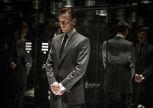Lower-level residents have long been subjected to discrimination and humiliation. In order to satisfy the gathering of upper-level residents, the power of the lower-level residents is often cut off; the children of the lower-level are forbidden to swim in the upper-level swimming pool because they are too noisy. In order to maintain their status, the upper-class residents must hold elegant gatherings, observe the etiquette of the nobility, and present a rational and restrained appearance; at the same time, they must always guard against provocations from the lower-class residents and plan countermeasures for this.
Finally, the lower-level residents finally couldn't bear it. Their emotions and feelings were closer to the primitive, and the strategies they adopted were more sincere and direct: how cool and how come!
The actions taken by Wilder, the most violent resident, triggered a direct conflict between the upper and lower floors. When he was angry when he heard that the children were driven out of the swimming pool, I seemed to see a young man surnamed Mao raising his arms to greet his little friends: fuck him, we smashed in the water!
This scene is so familiar. The childhood textbooks depict many stories that have emerged in this way. They either failed miserably or established a brand new dynasty after success. No matter what, the light that shines on them is always just and moral. . In this film, Wilder is just an empty and wild saboteur. He did not provide a solution (such as establishing a more reasonable new system), but on behalf of the lower-level residents to vent and destroy for a long time.
And what allowed the upper class residents to completely break the shackles was Monroe's death. This death completely released the upper-class residents: it turns out that everyone is living a life that seems to be civilized! The big deal is to use death as the ending like Monroe, anyway, enough! Suppress a fart! When the bondage of civilization is taken away from the hearts of the upper-class residents, the desires and vents they exploded are as strong and chaotic as the lower-class residents, and their loss of control is equally thorough. Stripped off the floors, they are actually the same type of people as the residents on the lower floors.
There are only two real "civilized people" in this building, and one of them is the designer of the building. He truly identified with civilization and etiquette, and castrated his brutality and bloodliness with self-cultivation. Therefore, when he designed the building, he required the residents according to his own civilized standards. The higher the floor, the more expensive, everyone is working towards the most civilized peak. This seems to lead to a good civilized society.
However, he did not provide people who climbed up with their original instinct to vent. He himself pinned his instinctive venting on his wife. Although he has always sneered at her and complained about her stupid behavior (planting a tree on the top of the building to ride a horse), he knew very well that he could not leave her, otherwise he would be just a machine. After the loss of sexual ability, the designer positioned himself as a god, and wanted to set a role and position for everyone in the building. This is a bit indifferent and taken for granted, not grounded.
Another "civilized man" is the protagonist of the film, the doctor played by Dou Sen. As soon as the designer came up, he saw the potential of the doctor: this is also an aristocrat who recognizes civilization and education from the bottom of his heart, even though the floor he is on is not high. The doctor has stepped up from the bottom step by step, and has not been self-castrated, but honestly confessed his desires. Therefore, he follows the desire of the body to pursue the designer's lover; at the same time, he appreciates and recognizes the wilder more. He feels that this kind of life is much faster than his own depression.
But after all, the doctor never gave up civilization. His upbringing has become a value in his bones. He is not restrained in order to climb up and prove to others that he has education, but truly agree with such restraint. Therefore, he always insisted on exercising, never hurt the innocent or lost his demeanor in the most chaotic time, and was always gentle to all women and children. His persistence almost collapsed, but he still clenched his teeth to guard his principles by "brushing the wall".
The doctor expressed opposition to the "civilization" designed by the designer. He always has respect for Wilder. He disagrees with the designer's previous strategy of "directly obliterating and denying wildness". That civilization and upbringing is just a representation, and they all have the same desire to be free from any restriction in their bones. But doctors can't find a way to coexist between civilization and wildness. The doctor and the designer worked together to make the wilder (the wildness of the people in the building) exist in the building in some way, but they all failed. Wilder was uncontrollable, killed the designer, and then went to ruin himself. And the doctor who survived finally gave up the civilization he had insisted on, began to kill the dog and roast his legs, and returned to barbarism.
The film gives people a pessimistic perspective: the restraint of barbarism and nature is doomed to fail, and modern "civilization" will eventually be destroyed. This perspective was put forward by a writer decades ago, who put the common people at the time in a future scientific and technological society. Fortunately, reality is not so pessimistic. With the changes in education and concepts, the proportion of "civilized people" like that designer and doctor in "high buildings" is gradually increasing, and society is becoming more and more mature. This has led to those middle-level and upper-level households that are not so prone to complete collapse and irrationality. The key to stability is whether the criteria for determining the upper and lower positions are reasonable, and whether everyone has a chance.
In addition, for the story of civilization and barbarism, you can refer to Mr. Lao She's short story "Neighbors", which is more verbose and has a sense of substitution for us.
View more about High-Rise reviews











